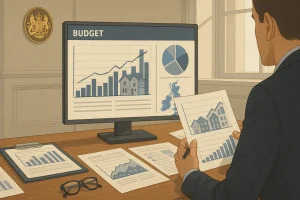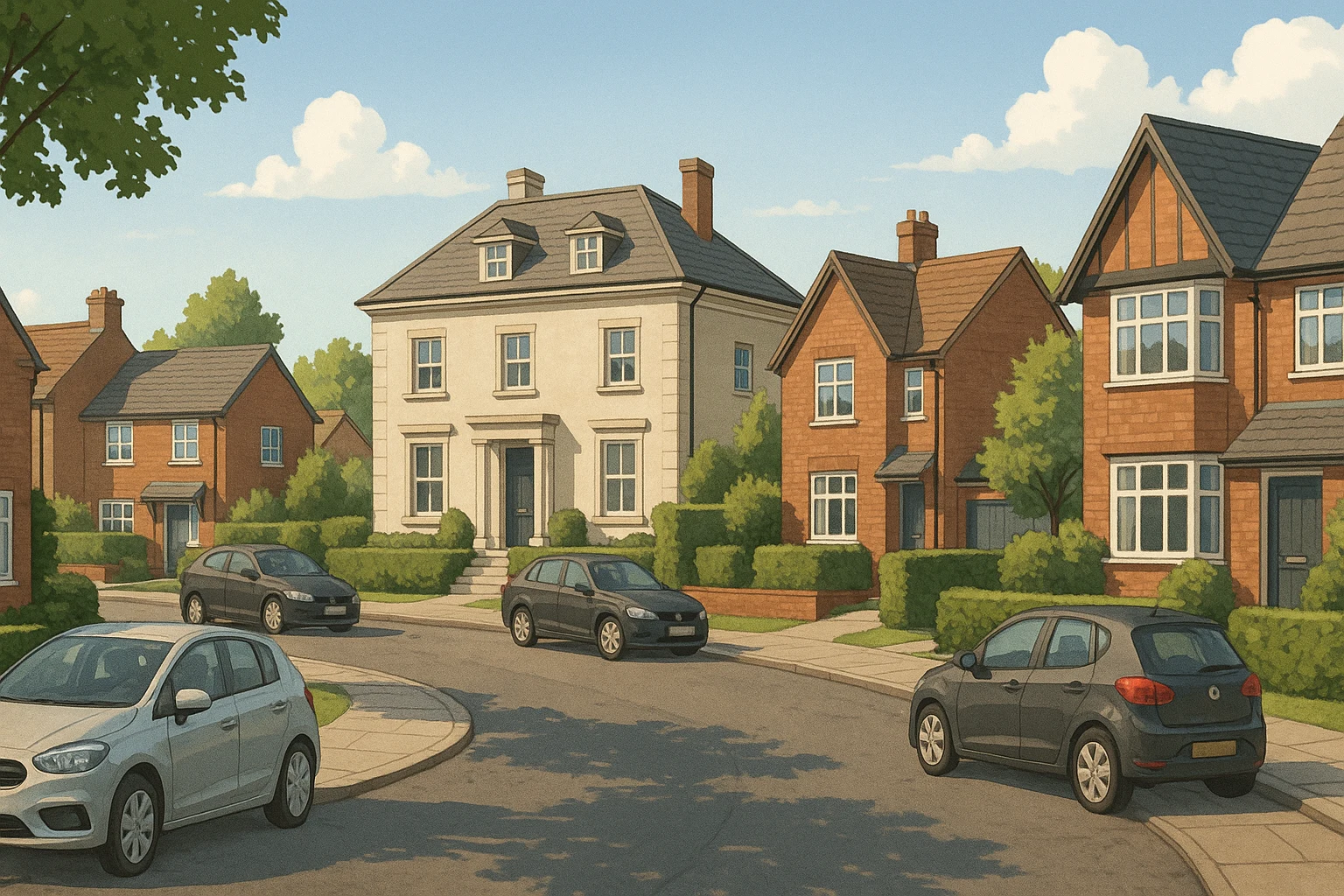Table of Contents
ToggleAs the UK heads into one of its most anticipated fiscal moments of the decade, the question of whether the country’s property tax system is still fair and functional is at the forefront of political debate. Council tax, the levy charged by local authorities on residential properties, is based on outdated property valuations from 1991, more than 30 years ago. In an era where house prices have soared, the current system is increasingly seen as regressive, disproportionately benefitting the wealthy and disadvantaging those in lower-valued homes.
Chancellor Rachel Reeves, the first woman to hold the role in British history, is now reportedly considering bold changes to this ageing system. With a crucial Autumn Budget due on 26 November, her team is weighing the introduction of new, higher council tax bands aimed at owners of the most expensive homes in England.
But what exactly are these proposed changes, and why are they being considered now?
Why Is Rachel Reeves Considering Council Tax Reform?

The need for reform is being driven by both economic necessity and political ideology. Economically, Reeves is facing a multi-billion-pound fiscal shortfall, the result of sluggish economic growth, increased government borrowing, and recent U-turns on spending commitments. Politically, Labour has pledged to follow strict fiscal rules, meaning that any new spending must be matched by revenue or offset by cuts elsewhere.
In this context, council tax reform is seen as one of the more viable, low-risk ways to raise additional funds. Unlike income tax or national insurance increases, raising council tax on high-value homes targets asset wealth rather than earned income, a distinction that aligns with Labour’s pledge to protect “working people”.
Reeves herself has said that higher taxes on the wealthy will be “part of the story” in her Budget, and insiders confirm that changes to council tax are actively under discussion. These changes would not constitute a full overhaul, but rather a targeted extension of the existing banding system to make it more progressive and reflective of today’s property market.
What Changes Are Being Proposed to Council Tax Bands?
Under the current system in England, homes are placed into one of eight bands, from Band A (lowest value) to Band H (highest value). However, these bands are based on 1991 property values, a time when a home worth £320,000 or more was considered high-end. Today, that figure would barely buy a two-bedroom flat in parts of London.
To address this, Reeves is considering the introduction of new higher bands, possibly Bands I, J, and K, to cover homes worth far more in today’s market. This would effectively expand the system at the top, allowing the government to levy more tax on the most valuable properties without affecting the majority of homeowners.
Below is a simplified comparison of the current and proposed structures:
| Criteria | Current System | Potential Reform |
| Valuation Year | 1991 | Could involve partial revaluation of top properties |
| Number of Bands | 8 (A–H) | Expanded to include Bands I, J, K |
| Top Band Threshold (1991) | £320,000+ | New bands for homes worth £2m+ today |
| Geographic Impact | National, but disproportionately affects London | Focused on high-value areas (London, South East) |
| Administrative Model | Local authority-led | May contribute revenue to central government |
While no final decision has been announced, sources suggest the measure could generate £3–£5 billion annually, offering a politically palatable revenue stream without introducing a separate mansion tax or capital gains tax on primary residences.
Why Is This Reform Gaining Momentum Now?

The idea of taxing expensive homes more heavily isn’t new. Former Chancellor George Osborne considered a similar approach in 2012 during the coalition government, proposing additional council tax bands to fund tax cuts elsewhere. That proposal was ultimately blocked by then-Prime Minister David Cameron due to fears of political backlash.
However, conditions in 2025 are different. With growing concern about intergenerational inequality, and increased public scrutiny of wealth concentration in property, the political climate is more favourable to such changes. Several influential economists and think tanks have voiced their support.
Michael Sherwood, a former Goldman Sachs executive, told the Financial Times:
“Council tax is very unfair. If you have more expensive homes, you should pay more for them.”
Ruth Curtice, head of the Resolution Foundation, said:
“It wouldn’t fix the whole property tax system, but it’s a start and a fair one.”
Even Edward Troup, former top civil servant at HMRC, argued that higher property taxes on the wealthy could provide political cover for other tough fiscal decisions.
How Would These Changes Impact Homeowners?
For most homeowners, especially those in Bands A–E, these proposed reforms are unlikely to have a direct effect. The changes are expected to be highly targeted, aimed at the upper end of the housing market.
However, for owners of homes worth over £2 million, the financial impact could be significant. A supercharged council tax banding system could mean thousands of pounds in additional annual taxes, particularly in London and the South East.
There are also secondary effects to consider. Estate agents and property developers warn that such a move could affect the high-end property market, potentially slowing down transactions as buyers and sellers wait to see how the changes play out. Some experts suggest that the reforms may even lead to a wave of downsizing among older homeowners seeking to avoid higher taxes.
However, mechanisms to defer payments for “cash poor” owners, such as pensioners living in high-value homes, are being considered. Under such schemes, additional tax owed could be paid later for example, when the property is sold or passed on through inheritance tax.
Could Council Tax Reform Be a Stepping Stone to Broader Property Tax Changes?
While the current discussion focuses on council tax bands, the broader conversation around property taxation in the UK is intensifying. Many economists have argued that the system needs a complete overhaul, including revaluations, the abolition of stamp duty, or even the introduction of an annual property levy.
However, Reeves appears cautious about pursuing such radical measures, at least for now. She has signalled that a nationwide revaluation of all homes, which would be necessary for a full reset of the council tax system, is not a political priority, even if it makes economic sense.
Instead, her focus seems to be on targeted, incremental changes that can raise revenue without triggering widespread appeals or panic in the housing market. By using the existing council tax infrastructure, Reeves avoids the pitfalls of creating entirely new systems, which could be costly, complex, and politically risky.
How Does This Align with Labour’s Broader Fiscal Strategy?

Rachel Reeves has consistently branded herself as a “pragmatic chancellor”, one who balances fiscal responsibility with progressive values. Her economic strategy, often referred to as “securonomics”, centres on rebuilding the public finances while ensuring fairness in who bears the tax burden.
The proposed council tax band expansion fits well within this framework. It allows her to raise revenue in a targeted and symbolic way, showing that the wealthiest are contributing more, without breaching Labour’s promises to working people.
Sources close to the Treasury have said that any decision will be guided by “administrative simplicity” and political feasibility, in other words, reforms that are hard to oppose and easy to implement.
Could These Changes Create Regional Disparities?
One of the criticisms often levelled at property-based taxation is that it can create regional imbalances. For example, a modest semi-detached home in London might be worth the same as a large detached property in the North East, yet both may fall under the same council tax band.
Adding new higher bands could widen this disparity, unless paired with regional adjustments or exemptions. That said, the impact is likely to be concentrated in the top 1–2% of properties, reducing the risk of widespread regional resentment.
Some experts have called for England to follow Scotland, which is also exploring new council tax bands to modernise its property tax regime. A uniform approach across the UK could help ensure fairness and consistency.
What Comes Next Before the Autumn Budget?
With the Budget scheduled for 26 November 2025, the final shape of the policy is still being developed. Consultations are reportedly taking place within the Treasury and the Office for Budget Responsibility (OBR), focusing on how much revenue the new bands could raise, how to implement them, and how to manage public reaction.
If Reeves proceeds, the new bands would likely be announced during the Budget, followed by a period of public consultation. Implementation could begin as early as 2026, potentially in stages to allow homeowners and councils time to adjust.
The Treasury has declined to comment officially, following its long-standing practice of not discussing tax changes ahead of fiscal events.
FAQs About Rachel Reeves’ Council Tax Reform
What are council tax bands based on?
They are based on 1991 property valuations. Since then, house prices have changed dramatically, but the bands have not.
Why are new bands being introduced now?
To raise revenue from the wealthiest households in a way that aligns with Labour’s fairness agenda and doesn’t impact the majority.
Will this mean everyone pays more council tax?
No. The proposals target only high-value properties. Most households would not be affected.
Are these changes confirmed?
Not yet. Discussions are ongoing and decisions will be finalised in the 26 November 2025 Budget.
Could pensioners be protected from higher payments?
Yes. Options like deferred payments are being considered for elderly or “cash poor” homeowners.
Is this a mansion tax?
Not directly. It is an extension of the existing council tax system using new bands, not a new form of tax.
Will property values be revalued?
A full revaluation is unlikely, but targeted assessments of high-end properties may take place.




